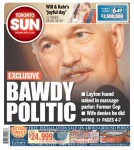Joseph Brean in the National Post:
That the rich should contribute more than their current share to the common good is a proposal with popularity. From Paris and London to Nova Scotia and Alberta, “tax the rich” has become a dominant theme in budget debates and elections around the world.
In Ontario, for example, NDP leader Andrea Horwath’s proposal to create a new tax bracket for people who make more than half-a-million dollars a year, illustrates the persistent attraction of such schemes for governments in deficit.
“The issue really is one of perceived fairness,” said Robin Boadway, a taxation expert and professor of economics at Queen’s University, who notes that the income of the highest earners has been increasing much faster than the middle and lower ranks. Taxation, to a great degree, relies on the goodwill and trust of citizens, he said, and inequality in tax codes can violate that trust.
Governments acting like Robin Hood, however, have tended to provoke unforeseen problems, most recently in Britain, where an effort to tax the rich ended up — quite literally — costing the government deeply.
It always seems to be a surprise when people respond to incentives in creative ways … and this applies especially to creative ways to avoid paying higher taxes. People will adjust their behaviour to minimize their tax burden — both legally and not-as-legally. This is after all one of the reasons that there are so many tax provisions: the government wants to encourage certain kinds of behaviour (and so gives a tax credit) and discourage other kinds of behaviour (and so levies a specific tax on it). Flexibility occurs on both the tax-levying and tax-paying sides of the fence.
One of the complaints of middle-class taxpayers is that there are few mechanisms they can use to legally reduce their tax burden, while the wealthy have lots of ways to do this. This isn’t going to change if the government increases the top rate of tax — in fact it will encourage more creative use of the tax-lowering provisions of the law (and lawyers and accountants will benefit by helping their wealthy clients ot take advantage of those provisions).




